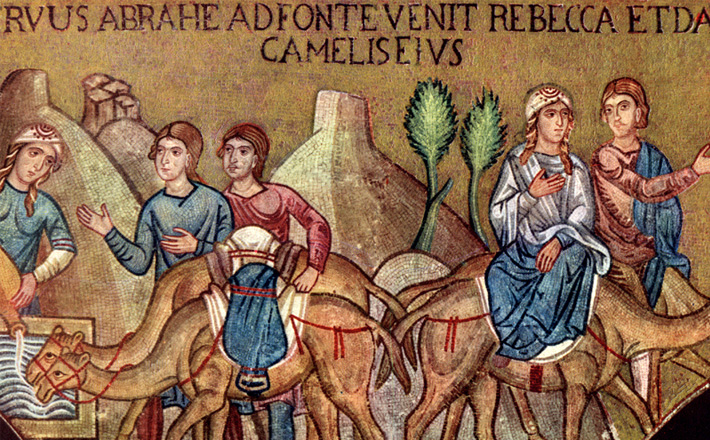Commentary on Matthew 11:16-19, 25-30
Matthew persistently affirms that God’s empire, embodied in the proclamation and teaching of Jesus, brings both judgment and salvation, both healing and division.
Jesus’ teachings in the two portions of this lectionary reading illumine the dynamics of this division, focusing especially on the failure of those who have witnessed Jesus’ ministry to respond (11:16-19) and on the success of his ministry among the most vulnerable (11:25-30; the lectionary skips 11:20-24, which announce judgment on the cities where Jesus has ministered).
Earlier in this chapter, in response to questions from the disciples of John the Baptizer, Jesus has clarified the nature of his ministry (11:2-6) and then offered a longer description of the ministry of John himself (11:7-18). John is “Elijah,” the eschatological forerunner, a rough figure whose proclamation, which has apparently focused especially on judgment, has provoked strong reactions, including violence.
While Jesus, like John, announces the advent of the empire of heaven, his ministry has not resembled the harsh, abrasive cast of John’s, which is probably why John’s disciples have come to ask Jesus if he is really the one coming or not (11:2-3). But whether the announcement of God’s presence and power is cast as judgment or as redemption, the response has been the same. Whether it was John or Jesus calling the tune, few have left the sidelines to join the dance, even in the cities of Galilee where Jesus has conducted most of his ministry (11:20-24).
Jesus compares those who are rejecting this proclamation to street urchins sitting in the marketplace and refusing to play each other’s games (11:16-19). Matthew typically uses the expression “this generation” not to designate his contemporaries alone, but those in any era whose lineage is more clearly related to Adam and Cain and their offspring — i.e., to those who are unfaithful, unrepentant, and ultimately violent in their defiance of God (e.g., Matthew 23:29-36). This is the same “generation” that mocked Noah’s preparations for the flood, turned to idols after God delivered them from Egyptian slavery, and repeatedly pursued their own imperial ambitions in the face of prophetic warnings.
One group of these children wants to play “wedding” but can’t get the others to dance when the tune is piped. The other group wants to play “funeral” but can’t get the others to mourn with them. Mourning and dancing coincide with the differing casts of John’s and Jesus’ ministries. Just as some refused to repent when challenged by John, so, too, they refuse to join the celebrations of Jesus — “a man, a glutton and a drunkard.” The children all just sit, hurling their bitter invectives against one another. This becomes the new game. Sound familiar?
Contemporary politics has made us very familiar indeed with the game of reducing complex issues to ideals and platitudes, picking a side, and yelling at one another. Regrettably, the contemporary church, especially the Protestant church, is often on the cutting edge of this game. We have a long history of division over ideals, doctrines, and the quest to preserve a pure tradition. And when we divide, many of us want to pat ourselves on the back for playing the game so well.
In this posturing, we forget that the game to which Jesus call us is about discerning, turning toward, and bearing witness to the work of God in the world. Jesus’ statement that “wisdom is justified by her deeds” directs us to pay closer attention to the results of our actions, even as we consider who Jesus is and what his ministry is about. Is he just a rebel, mostly interested in crossing social boundaries and breaking taboos? Is he a defender of tradition and right doctrine? Or do his actions demonstrate divine presence and power (11:4-5)? Does Jesus, even “at play,” reveal God at work?
Jesus’ prayer/sermon in 11:25-30 identifies those who are most likely to be attuned to God’s work in the world, the “babies” rather than the “wise and understanding” (11:25). Jesus mocks those who claim for themselves wisdom and intelligence — most immediately the leaders and elites who oppose Jesus, but really those of any age or generation whose “wisdom” blinds them to what God is really doing.
God’s revelation comes instead to the “infants” (or “simpleminded,” “stupid”), whose vulnerability and humility make it possible for them both to see and to respond faithfully to God’s presence and power. What does it mean to take Jesus’ yoke and to learn from him (11:29)? Jesus’ Sermon on the Mount offers the best answer: those who are blessed neither accept this world as the way things must be nor return in kind the violence they endure at the hands of the powerful.
We are most likely to experience God’s presence and power in the company of the humble and vulnerable, the people who are usually found at the margins of our congregations. They may be children or strangers, people who are not sure whether or how they fit. They may be poets or artists, who are trained to look at the world differently. Whoever they might be in any given congregation, they will always be people who see what others do not, and thus help the rest of us deal with our blinding arrogance and entitlement. They may be people whose lives challenge the ideals over which we argue and divide.
The empire of heaven, after all, is not an ideal, but a reality made known through real acts and experiences of judgment, repentance, and redemption. The church that banishes the marginal, the vulnerable, and the humiliated does not prevent itself from being subject to the judgment of God; to the contrary, it is precisely through their eyes and voices that we can most clearly discern God’s judgment and mercy, through which our ongoing repentance is made possible. Judgment is a tool God uses to open our eyes and ears, to draw us toward repentance — not to induce brokenness but to uncover and heal what is broken.


July 6, 2014